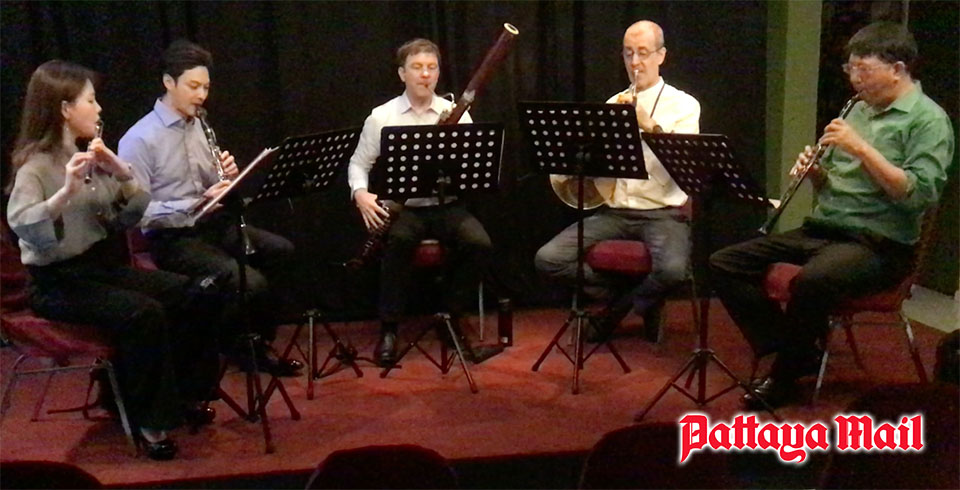
“Where have you all been?” Ben Hansen jokingly asked his audience at the beginning or a recent concert at Ben’s Theater, Jomtien. It was the first concert after the long pandemic break of almost three years, during which time the theatre has been silent. “Gone dark”, as they say in the theatre world. Not a note of music for months on end. Not a squeak. Except for some occasional squeaks from Ben’s two cats, Blacky II and Máxima (named after the Queen of the Netherlands).
Judging by the warmth and general bonhomie among the audience, everyone was delighted to be back together again and there were many familiar faces. They’d come along for the first concert of the new season, given by the Mahidol Woodwind Quintet which features some of the top players from the Thailand Philharmonic Orchestra. It was a fascinating programme too, ranging from Mozart to the twentieth century composers Paul Hindemith and Paquito D’Rivera. The nineteenth century was represented by the German composer August Klughardt whose music is rarely heard these days.
The Mahidol Woodwind Quintet is made up of Yu-Jin Jung (flute), Cooper Wright (oboe), Sooksan Ratanapol (clarinet), Daren Robbins (horn) and Christopher Schaub (bassoon). They began with Mozart’s Quintet in C minor, actually an arrangement of his Serenade No. 12 for Octet. Eighteenth century serenades were usually intended as light entertainment or even background music, but this one is rather a sombre work though little is known of its origins. It concludes with the usual theme and variations, a rather curious movement, which includes a few “Turkish” motifs, fashionable in the courts of late eighteenth century Vienna.
In complete contrast, the Mozart was followed by Paul Hindemith’s Kleine Kammermusik No. 2, written for the composer’s colleagues in the Frankfurt Opera Orchestra, of which he was a member at the time. The work dates from 1922 and it’s spiky, caustic music, sometimes slightly surreal but full of melody and lively rhythms and occasional references (intentional or otherwise) to works by other composers. The second movement contains a bizarre reference to the well-known waltz theme in Nicolai Rimsky-Korsakov’s dazzling orchestral work Scheherazade. The quintet gave an assured and compelling performance of the work and the rich sonorities of the instrumental writing were deeply satisfying. The articulation, so essential in this work was immaculate and the musicians had a fine sense of balance and phrasing. The fourth movement is only 23 bars long and made up of solo cadenzas. The players gave a fine account of the scampering, technically-challenging finale. The splendid playing made a lively ending to the first half of the concert.
The Mahidol Woodwind Quintet is made up of professional musicians with years of experience. All the players teach at Mahidol University’s College of Music yet it’s quite an international group. Flautist Yu-Jin Jung hails from the Republic of Korea and at the age of sixteen, began her studies at the Music and Arts University of the City of Vienna later moving on to studies in Graz and Stuttgart. Since 2013, she’s been Principal Flautist with the TPO. Thai clarinetist Sooksan Ratanapol also studied at Universities in Graz and Stuttgart, while the other three players originally come from America. Oboist Cooper Wright is an active performer and educator in Asia and recently returned from Indonesia where he was Principal Oboist of the Bandung Philharmonic Orchestra and the Amadeus Symphony Orchestra in Jakarta. Horn player Daren Robbins is Chair of the Brass and Percussion Department at Mahidol and teaches horn, brass literature and pedagogy while bassoonist Christopher Schaub teaches music theory, performance practice, music education, research methodology and chamber music. He’s also a founding member of the Asian Double Reed Association.
The second half of the concert began with the Wind Quintet Op. 79 by the grandly-named German composer and conductor August Friedrich Martin Klughardt. He was a friend of Liszt and Wagner and the composer of six operas, five symphonies and other orchestral works. But despite his prolific writing and good connections, his musical style was rather conservative. Nevertheless, this quintet from 1898 is charming music; full of lyrical melodies and lively inventiveness. The Mahidol Woodwind Quintet gave a superb performance of the work and the third movement was especially compelling. And I suppose you might rightly ask why is there a horn – a brass instrument – in a woodwind quintet. The answer is that it has always been there. Well, at least since the eighteenth century. The horn blends extremely well with the clarinet and the bassoon and is an obvious choice for enriching the instrumental tone colour.
The final work of the evening and a most appropriate one too, was a selection of movements from Aires Tropicales by the Cuban-American saxophonist, clarinetist and composer Paquito D’Rivera. The work dates from 1994 and features traditional Cuban musical styles. It’s fascinating music, with distinctive Cuban flavours, hints of baroque and classical ideas, occasional jazz harmonies, dexterous Latin-American rhythms and touches of the composer’s idiosyncratic humour. In much the same way that Stravinsky gentrified the jazz and ragtime idioms he sometimes used, D’Rivera seems to have taken a similar approach and produced a more sophisticated version of the original music. The Quintet gave a tremendous performance of the work.
Judging by the hearty applause, the entire evening was eminently successful and the fine performances given by the Mahidol Woodwind Quintet were much appreciated. And just in case you are wondering about Ben’s two cats Blacky II and Máxima, as a precaution they were invited to spend the evening in another room with a plentiful supply of food and drink. They must have been content in there, for not a meow was heard all evening. The cats were as quiet as mice.
 |
 |
 |





